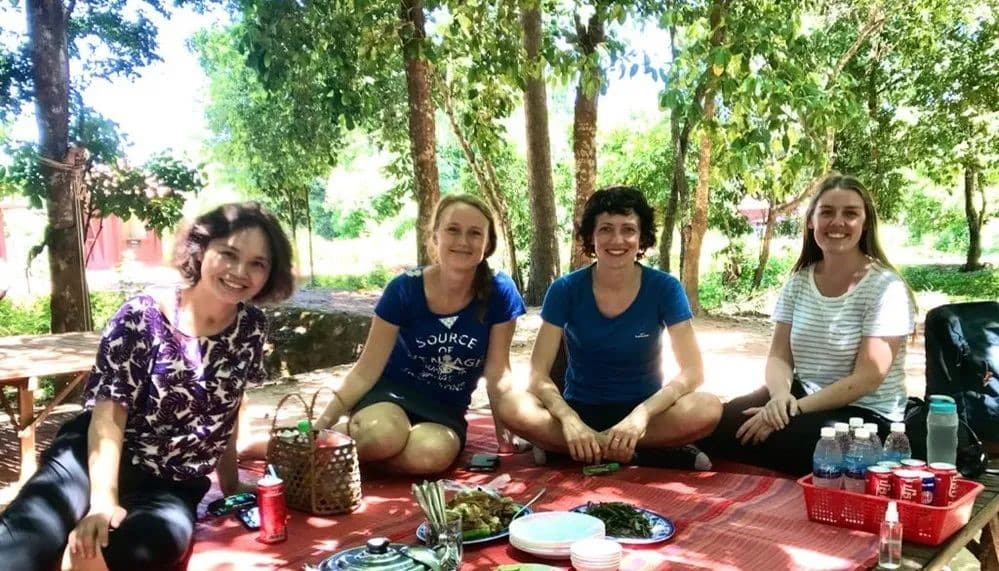While some Chinese social organizations (local term for NGOs) are trying to develop overseas, the stories of many Chinese individuals active in INGOs are equally remarkable.
During the past seven years, China House, a social enterprise registered in mainland China, has sent more than 2,000 young professionals to participate in sustainable development projects around the world.
CDB recently spoke to Liu Luxi (Lucy), who worked with China House as an executive assistant from 2016-17, and gradually became an international development practitioner.
For the past year, Liu has been working as Strategic Learning & Business Development Manager for Catholic Relief Services (CRS), an international NGO that operates in over 110 countries. Before that, she worked for the same organization in Cambodia and Sudan.
Starting out
Unlike many young Chinese desperate to decide their lifelong goals as early as possible, Liu had a different point of view: “It is okay not to be 100 percent sure at the beginning about where the road of life leads. Sometimes the answer lies in the journey itself, once we embark on it.”
When talking about how she got into the INGO field, she reveals she considered one of her college experiences a decade ago as the starting point. At that time, she was at Fudan University in Shanghai, and got the chance to go to UC Berkeley as an undergraduate exchange student.
“I grew up being a go-getter” Lucy recalled. “I was a firm believer in self-will and hard work alone, until my first time living abroad.”
As an international student who found the new environment novel and yet challenging, for the first time Lucy found herself overwhelmingly vulnerable, humbled, and warmly accepted by the “cooler kids” at school. For the first time, she realized the importance of people selflessly helping each other.
“The warmhearted support from local friends transformed me.”
It was during this period that Lucy developed a strong desire to help vulnerable and disadvantaged groups.
Additionally, the experience at UC Berkeley opened her eyes to issues around the world, as she learned the life stories of her diverse friendship group. As a former aspiring journalist, Liu enjoyed asking questions and learning new perspectives whenever she got this chance.

Going out
Liu had always wanted to visit Africa to learn about the nuanced dynamics at the ground level that she could not learn through secondary sources, and to understand what local NGOs, government agencies and communities themselves were doing to help people thrive.
In 2016, Liu joined China House in Kenya, where she conducted field research on a wide range of international development topics, implemented and monitored a multi-country wildlife conservation project as part of a team, and facilitated overseas assessments for Chinese investors.
Also, in this period, she was increasingly exposed to work related to sustainable development and became more determined to dedicate her career to this sector.
Liu became particularly interested in the work of project design, monitoring, and evaluation, as she enjoyed doing it in practice, and more importantly, saw the value of this type of work in holding NGOs accountable and helping them improve their program quality.
Graduate studies and internship
After finishing work in Kenya, Liu continued her studies in the US in 2017. She attended the Fletcher School at Tufts University for her master’s degree in development economics.
During her studies, Liu not only further strengthened her knowledge related to program management, especially in monitoring and evaluation, but also broadened her horizon in the sector.
She took relevant courses at Harvard and MIT, and built connections with different NGOs, government agencies and international organizations.
Through the referral from a Tufts alumnus whom she reached out to, Liu was offered an internship at a USAID youth employment project in Kenya. Her job was to design and execute an evaluative a study to analyze the outcomes of different types of vocational training programs, based on quarterly monitoring data. The influence of different individual factors such as region, age, and gender, also had to be considered.
Leveraging the substantial skills she gained through the internship, after graduation, she got a job at the World Bank focusing on African countries’ employment data analysis.
Working on the ground
While Liu appreciated the diverse and high-level exposure brought by the World Bank job that was based at the headquarters in Washington DC, she always dreamed of returning to a country office setting where she could be much closer to local communities.
“I hoped that there was more to my career than sitting in an air-conditioned office, looking at survey data on a computer screen. I wanted to see the faces and learn about the real lives behind the data,” she explained.
In 2020, in the midst of the pandemic, she had the opportunity to join Catholic Relief Services with the expectation of working directly with the country programs. “It was a dream come true for me.”
During the past few years, she has worked in CRS offices in Cambodia, Sudan and Tanzania. Her work includes not only monitoring and evaluation, but also all aspects of project management and business development, giving her a more comprehensive understanding of the sector.
On the ground, she has been able to learn from the national staff, program participants, local government authorities and other stakeholders, allowing her to better understand the complexity of this line of work.
Looking to the future, Liu expects to continue working in Tanzania for at least another year or two. She sometimes wonders herself where she will end up.
Having lived overseas for years, she is also curious about the domestic social organizations in mainland China and looks forward to learning more about the sector whenever she returns.



